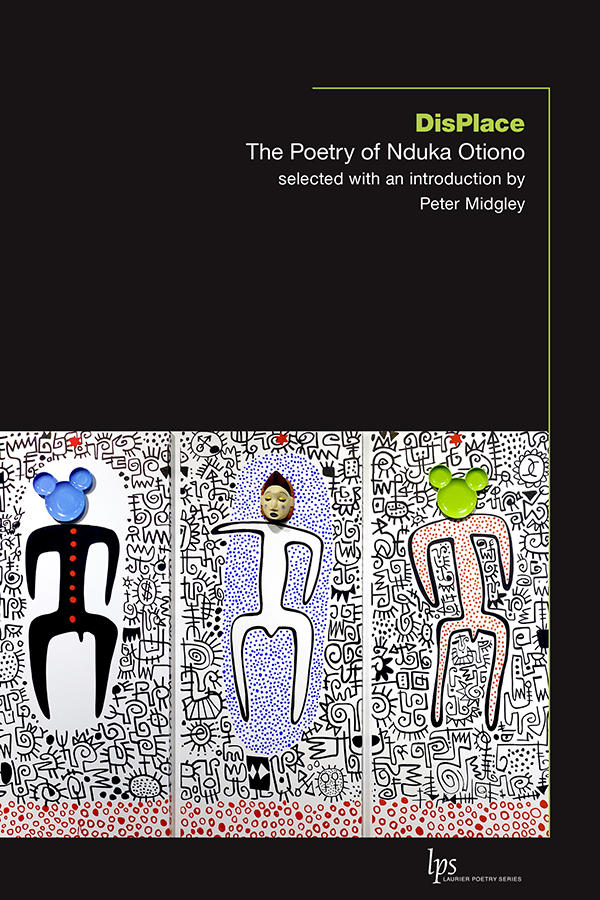As a former editor for an online journal and as a reviewer, I have to start by saying that some of the best creative writing of the Corona years has been produced by Nigerian writers, so I am proud and honoured to discuss Nduka Otiono’s collected works here, specifically as they relate to the themes of territory and topology.

What do I mean by territory? A geosophical perspective of place, what it means to be, to be here, and to belong. Otiono addresses this notion in the title of the collection itself in an interview in the Afterword of this book, stating, “in British English, the verb ‘displace’ is to move something from its perceived proper place and in the Nigerian Pidgin ‘Dis place’ equates to ‘This Place.’ This Nigerian Pidgin framing carries, for me, the weight of the expression, ‘This place where we live.’”
And what do I mean by topology? The bird’s-eye-view mathematical top-down perspective of place as it relates to connections as opposed to locations, taking from the definition in Sheila Hones, Literary Geography.
The new poems of this collection contain no epigraphs—unlike the selected works which follow—and address the Coronavirus pandemic, his father, his sister, and his identity. They are few but powerful additions to an already abundantly literary and engaged body of work.
Nduka Otiono speaks to his engagement with Canadian poetics in the afterword of the book too. His approach to hypertextual regionalism speaks to a deeply meditative engagement with literary geography, as is evident in his mentioning of the mystic Jesukayode who “presided over a spiritual shop at Alausa, Ikeja, Nigeria, in the 1990s” in “Midnight Voices” originally from Voices in the Rainbow and in his cycle of poems on petro-exploitation in Africa, “Homeland Securities” originally from Love in a Time of Nightmares.
Canadian poets of the ’60s and ’70s arguably maintained a vogue of literary tourism which often led them to Africa, while ongoingly, writers at home then and today increasingly included hyperaware productions of locality. In this way, a lot of contemporary Canadian and Nigerian writing can be compared in intent if not also in effect. Certainly, throughout Nduka Otiono’s earlier work presented further in the manuscript, place names, people, events, and dates signify the poet’s territory as a place in time experienced collectively, nostalgically, and critically, all at once.
Territory and topology are constantly in the spotlight of Nduka Otiono’s words, as witnessed by his geopolitical approach to dramatic dialogue in Voices in the Rainbow; in the same cycle mentioned above, “Homeland Securities,” he evokes Shakespeare for the epigraph to the second-to-last poem: “Security / is mortal’s chiefest enemy.” This line in the Scottish play foreshadows the titular character’s undoing, and in Nduka Otiono’s poem, is indicative of the aphoristic wisdom given to the would-be listener of his song “… laugh not or do so at your own peril: for you / will learn the meaning of homeland securities / under a leaking green-white-green / umbrella / in the gathering storm.”
Otiono is constantly dialoguing with the ethical dilemma of history and tradition, political and literary, whether bardic—Shakespeare, Wordsworth, Neruda, and Ginsberg—or Nigerian—Christopher Okigbo, Femi Oyebode, Sola Osofisan, and Niyi Osundare. And, in so doing, he produces a geospatial context that accurately depicts his lived experience, his grief, and his message. The result is a compelling odyssey of episodes, each evocative of their own personages and dénouements, each establishing Nduka Otiono as a troubadour (as he says himself), a pilgrim, and bard. Through each of these personalities, Nduka Otiono is never esoteric, solipsistic, or irreverent; rather, he is always present, nostalgic, and rhapsodic.
Bios
Jay Miller
Jay Miller is a poet, translator, and technical writer who lives in Montreal. He is currently learning to code, with a keen interest in Julia, data engineering and scientific programming. He can be found on Github and Twitter @sootynemm and on Mastodon @sootynemm@troet.cafe. His work can be found listed on sootynemm.com. [updates in 2023]

